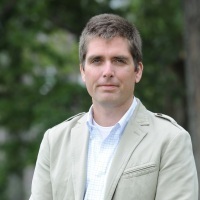
Daniel Rainham
Dr. Rainham's research interests focus on environmental patterns and changes as determinants of human health. His research aims to understand how these patterns are created, how they vary in space and time, and how they are changing, particularly in the context of environmental sustainability. He also has an active interest in the development and deployment of geospatial technology in support of epidemiological inquiry, in particular with respect to exposure assessment, place and health, and environmental correlates of health.
Acknowledging the inseparability of people and the environment is key to the future sustainability of humanity. Our knowledge of the unexpected consequences associated with the widespread use of harmful chemicals and toxins has improved significantly since the first warnings of Rachel Carson in 1962. Despite this knowledge we continue to pour toxins and other harmful substances into the water we drink, the air we breathe and the soil from where we grow our food.
Through his research, Rainham hopes to tell the story of how humans and other species are exposed to environmental contaminants and how these exposures lead to harmful health effects. The miniaturization of technologies for measuring environmental contaminants, and for predicting human movement allow for the development of accurate human exposure models. Linking environmental epidemiology with geographic information systems and global positioning systems helps him to study how the quality of the environment can affect health status.
Dr. Rainham hopes that his work will help decision makers account for the human health implications of environmental degradation. A healthy environment will help to ensure a healthy life for all people as well as good health for generations to come.
Phone: +1 (902) 494-1286
Address: Faculty of Science, LSC827
1355 Oxford Street
Halifax, NS B3H 4J1
Acknowledging the inseparability of people and the environment is key to the future sustainability of humanity. Our knowledge of the unexpected consequences associated with the widespread use of harmful chemicals and toxins has improved significantly since the first warnings of Rachel Carson in 1962. Despite this knowledge we continue to pour toxins and other harmful substances into the water we drink, the air we breathe and the soil from where we grow our food.
Through his research, Rainham hopes to tell the story of how humans and other species are exposed to environmental contaminants and how these exposures lead to harmful health effects. The miniaturization of technologies for measuring environmental contaminants, and for predicting human movement allow for the development of accurate human exposure models. Linking environmental epidemiology with geographic information systems and global positioning systems helps him to study how the quality of the environment can affect health status.
Dr. Rainham hopes that his work will help decision makers account for the human health implications of environmental degradation. A healthy environment will help to ensure a healthy life for all people as well as good health for generations to come.
Phone: +1 (902) 494-1286
Address: Faculty of Science, LSC827
1355 Oxford Street
Halifax, NS B3H 4J1
less
InterestsView All (16)
Uploads
Papers by Daniel Rainham